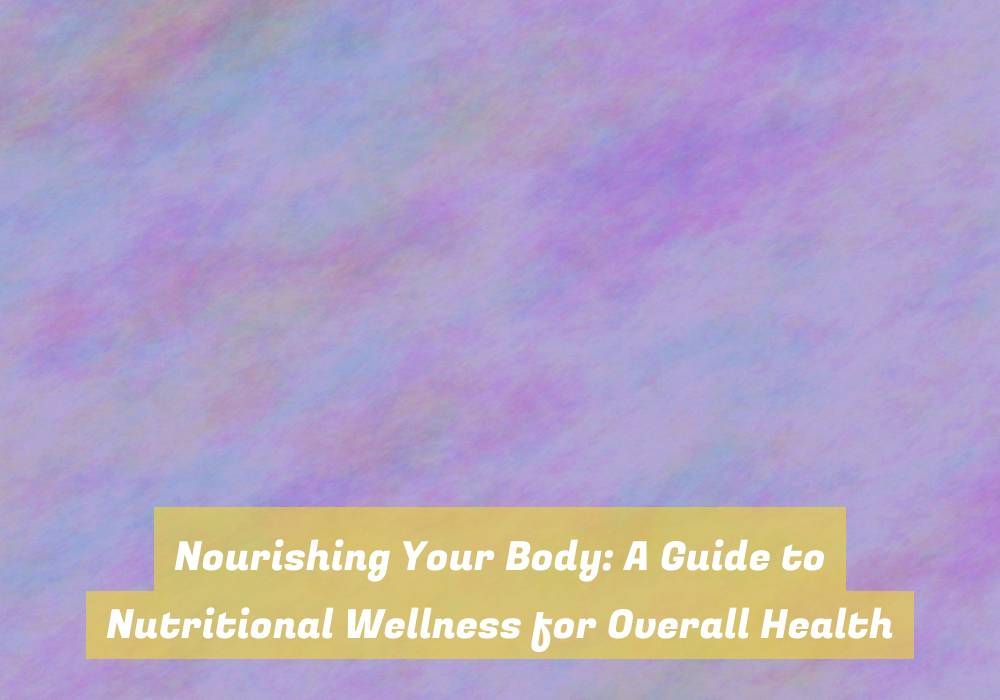Nourishing Your Body: A Guide to Nutritional Wellness for Overall Health
YouG??ve probably heard the saying, G??You are what you eat.G?? But how often do you truly consider the impact of your food choices on your overall well-being?
Nourishing your body goes beyond just satisfying hunger; itG??s about providing your body with the essential nutrients it needs to function at its best.
From understanding your nutritional needs to establishing healthy eating habits, this guide will help you navigate the complexities of achieving optimal health through informed food choices.
But the journey to nutritional wellness doesnG??t stop there. Stay tuned to discover the key to unlocking your bodyG??s potential for vitality and longevity.
Understanding Nutritional Needs
Understanding your nutritional needs is essential for maintaining a healthy and balanced diet. Every individual has unique requirements based on factors such as age, gender, activity level, and overall health. By being aware of your nutritional needs, you can make informed choices about the foods you consume, ensuring that your body receives the essential nutrients it requires to function optimally.
Start by assessing your calorie needs. This is influenced by your basal metabolic rate and physical activity level. Understanding the number of calories your body needs will help you maintain a healthy weight and energy balance. Additionally, consider your macronutrient requirements. Carbohydrates, proteins, and fats play distinct roles in your body, and itG??s important to consume them in appropriate proportions. For instance, if you engage in regular exercise, your protein needs may be higher to support muscle repair and growth.
Furthermore, donG??t overlook the significance of micronutrients such as vitamins and minerals. These play crucial roles in various bodily functions, including immune support, bone health, and energy production. By understanding your individual nutritional needs, you can make mindful choices that promote overall wellness and vitality.
Making Informed Food Choices
To maintain a healthy and balanced diet, itG??s crucial to make informed choices about the foods you consume, ensuring that your body receives the essential nutrients it requires to function optimally. Start by paying attention to food labels. Look for products with lower amounts of added sugar, sodium, and unhealthy fats.
Choose whole foods like fruits, vegetables, lean proteins, and whole grains. Incorporate a variety of colors into your meals to ensure youG??re getting a wide range of vitamins and minerals.
Be mindful of portion sizes to avoid overeating, and aim for smaller, more frequent meals throughout the day to keep your energy levels stable.
When dining out, opt for healthier cooking methods like grilled, steamed, or baked dishes, and be cautious of portion sizes, as restaurant servings are often larger than necessary.
Lastly, stay informed about the latest nutritional guidelines and recommendations to ensure that youG??re making the best choices for your overall health and well-being. Making informed food choices is a powerful way to nourish your body and support your long-term health.
Establishing Healthy Eating Habits
Developing healthy eating habits involves making mindful choices about the foods you consume and creating a balanced and sustainable approach to nourishing your body. One crucial aspect of establishing healthy eating habits is to prioritize whole, nutrient-dense foods such as fruits, vegetables, whole grains, lean proteins, and healthy fats. By incorporating these foods into your daily meals, you provide your body with essential vitamins, minerals, and antioxidants that support overall health.
Additionally, itG??s important to pay attention to portion sizes and to practice mindful eating. This means being aware of your bodyG??s hunger and fullness cues, eating slowly, and savoring each bite. By doing so, you can prevent overeating and promote better digestion.
Another key component of healthy eating habits is to limit the intake of processed and sugary foods. While these items may be enjoyable in moderation, they shouldnG??t make up a significant portion of your diet. Instead, focus on consuming foods that fuel your body and provide sustained energy throughout the day.
Achieving Optimal Health and Well-being
After establishing healthy eating habits, you can now focus on achieving optimal health and well-being by incorporating regular physical activity into your daily routine.
Regular exercise is essential for maintaining a healthy body and mind. It not only helps you control your weight, but also reduces the risk of chronic diseases such as heart disease, diabetes, and certain cancers.
Engaging in physical activity releases endorphins, which can improve your mood and reduce feelings of stress and anxiety.
Incorporating at least 150 minutes of moderate-intensity aerobic activity, such as brisk walking or cycling, into your weekly routine can significantly impact your overall health. Additionally, including strength training exercises at least two days a week can help you build and maintain muscle mass, which is important for supporting your metabolism and overall functionality.
ItG??s important to find activities that you enjoy, whether itG??s dancing, swimming, playing a sport, or simply going for a hike. By making physical activity a priority, you can enhance your well-being and quality of life.
Conclusion
In conclusion, taking care of your body through proper nutrition is essential for overall health and well-being. By understanding your nutritional needs, making informed food choices, and establishing healthy eating habits, you can achieve optimal health.
Remember to prioritize nourishing your body with a balanced diet and staying hydrated. With these simple steps, you can take control of your health and feel your best every day.





